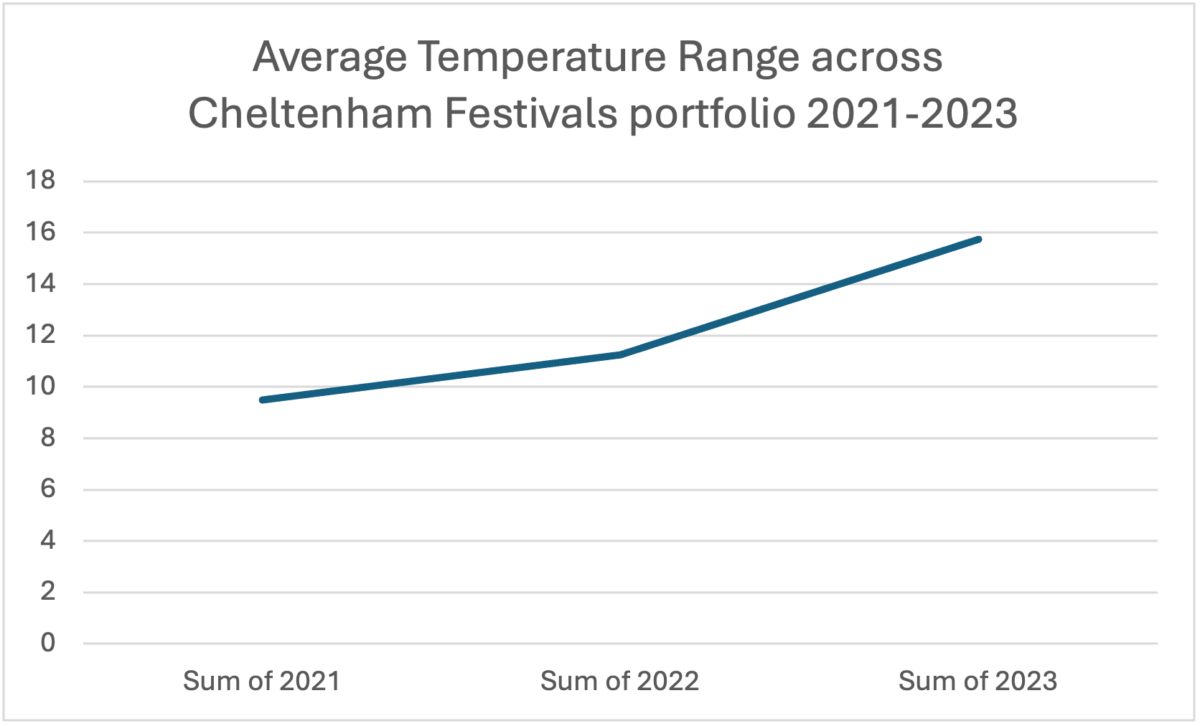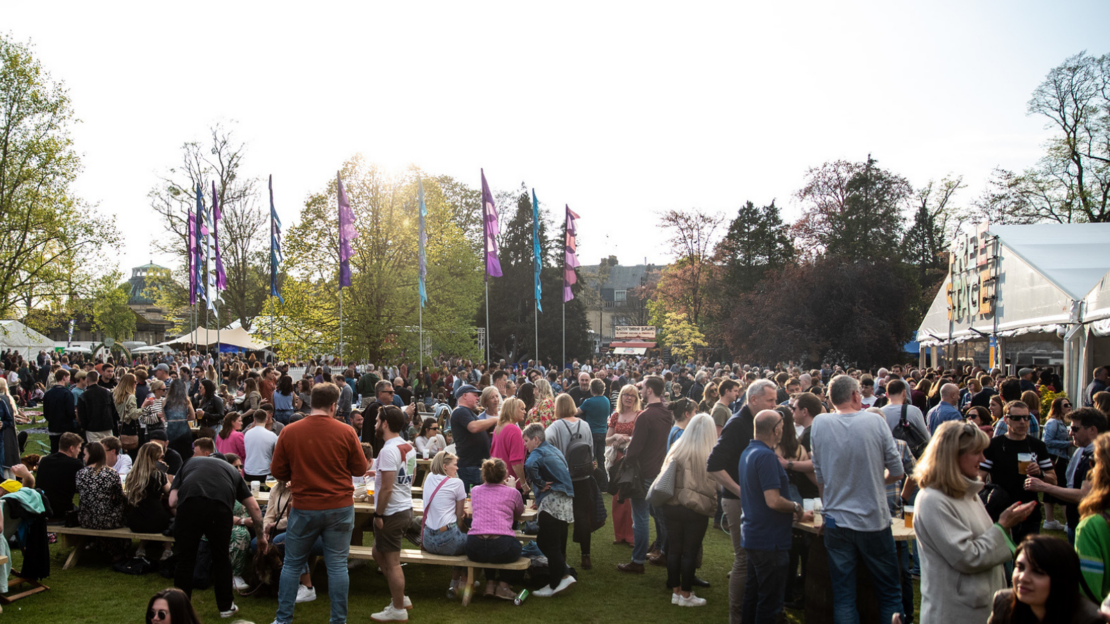How is the changing climate affecting events, and how can event teams respond by building resilience into their sustainability strategy? In this blog, Andrew Lansley, Innovation Manager for Cheltenham Festivals and Senior Academic at the University of Gloucestershire, explores how climate change is impacting the festival industry and shares specific research with Julie’s Bicycle and Arts Council England into how Cheltenham Festival has been affected by shifting weather patterns. He shares how Cheltenham Festivals’ sustainability strategy has responded to the ongoing climate crisis: from reviewing onsite infrastructure to creating training protocols for extreme weather events, working with partners and venues and integrating climate themes into programming to foster awareness and action.
“Climate change is upon us, and evidence suggests a strategic – and urgent – response is required in order to prepare organisations for environmental impacts that are already predicted to influence the way they need to plan and prepare for the future. The world of events is dynamic and diverse, and environmental impacts are increasingly providing challenges for organisers and audiences alike. Whether it is high temperatures creating harsh conditions for crew building a site, or high winds shutting them down, the climate is growing in influence as yet another challenge faced by events and festivals within an already struggling sector.
“The world is already experiencing changes in average temperature, shifts in the seasons, an increasing frequency of extreme weather events, and slow onset events. The faster the climate changes and the longer adaptation efforts are put off, the more difficult and expensive responding to climate change will be.” UN Climate Change
Cheltenham Festival’s sustainability strategy includes scope to audit and adapt to progressive frameworks and practice to build a response to the ongoing climate crisis. Engagement in emerging pilots and programs (such as the Green Events Code of Practice pilot) and Arts Council England (ACE) sustainability initiatives has helped keep Cheltenham Festivals engaged with key organisations and latest developments within the sector, guiding our strategic planning as it adapts.
“In the UK we’re already seeing hotter summers, warmer wetter winters and increased weather extremes. These changes are affecting our health, food security, and ecosystems… (and) serves as a glimpse into a future without climate adaptation.” Julie’s Bicycle
It was through the work of Julie’s Bicycle that Cheltenham Festivals were able to contribute to exploratory conversations, responding to reflections shared within peer sharing groups as part of the ACE’s Environmental Programme. Within the organisation we were keen to understand the local context of this challenge further, so decided to explore weather data aligned with our event delivery schedule, identifying the following trend which suggests we have experienced an increase in temperature ranges across our festivals since 2021:
| 2021* | 2022 | 2023 | |
| Jazz | Lo 6 / Hi 15 (9) | Lo 7 / Hi 17 (10) | Lo 8 / Hi 20 (12) |
| Science | Lo 19 / Hi 28 (9) | Lo 14 / Hi 23 (9) | Lo 8 / Hi 27 (19) |
| Music | Lo 15 / Hi 23 (8) | Lo 15 / Hi 27 (12) | Lo 10 / Hi 22 (12) |
| Literature | Lo 7 / Hi 19 (12) | Lo 3 / Hi 17 (14) | Lo 2 / Hi 22 (20) |
| Mean Range Hi/Lo | ±9.5°C | ±11.25°C | ±15.75°C |
*some events did not run to their full capacity/duration in this year due to COVID 19
Following the pattern or increased temperature ranges for our events, 2023 saw extreme weather variables impact our festivals. Cheltenham Science Festival experience above average temperatures for June for half its duration, as well as a lightning storm during the festival itself. Cheltenham Literature Festival was also unseasonably warm for the time of year – with Gloucestershire’s average high temperature for October (15C) being exceeded for eight of the ten days of the festival. Like the Science Festival, these high temperatures were followed by a storm overnight on Thursday 12th October, which led to flooding onsite and the need to relocate infrastructure in line with wet weather plans.

Adaptive Programming and Design: Beyond Wet Weather
As a response to this we are now looking at how we can adopt new processes within our three-year sustainability strategy that will help to re-evaluate event planning with climate resilience in mind – expanding “beyond wet weather” plans. These will be drawn together from departments across our organisations to consider the environmental impact of transportation, logistics, and site construction. This will run in parallel to the reuse and regeneration elements of strategy, to ensure we consider impacts from adaptive processes to minimise any further impacts.
Some of our plans include:
- Reviewing our infrastructure onsite e.g. some installations at the Science Festival are outdoors, and subject to the elements. We are looking to create renewed training materials to include severe weather protocols for extreme events such as heatwaves and storms.
- We are exploring adaptable structures and pathways, that are also accessible, that can be deployed in severe weather contexts: e.g. storms, lightning,
- During delivery of our summer events (i.e. Science & Music Festivals) the weather is generally warmer, so we are looking at how we can protect venues/marquees against growing temperature variations. This is difficult in the face of a lack of regulations for maximum working temperatures in the UK, so we’re creating internal standards for a heat stress policy (times, temps, water and creams)
- We will be looking to work with our local authority (Cheltenham Borough Council) to look at drainage infrastructure, and how the impact of venue builds on green spaces can create additional impacts beyond run off.
- We are looking to scope unseen onward impacts on infrastructure that might be caused by last minute adjustments/procurement emergencies and efficiencies.
- Opting for temporary and sustainable materials in venue design.
- Integrating adaptive related climate themes into programming to foster awareness and action.
Digital Transformation and Virtual Engagement
We are continuing our research into digital technologies, not just to expand virtual engagement and reduce the carbon footprint associated with physical events, but to explore alternative formats that could part of a permanent solution to deliver flexible, adaptable event formats. As such we have taken the concept of virtual events ‘back to line’ in how we might source, produce and broadcast our events, online educational programs and how we might create digital resources and XR environments.
Resilience through community partnerships
We collaborate regularly with local community groups, environmental organisations, and councils to share knowledge, resources, and best practices in adapting to climate impacts. We have formed initiatives and joined partnership (such as Cheltenham Zero) to develop and implement joint activities addressing climate resilience and sustainability, with accessibility as a particular focus. We are working hard to share case studies and insights as we implement and develop this work, and believe a localised approach presents both a sustainable and resilient model for adapted resource and operations.
Climate-Resilient Resource Management
We are looking to assess (and adapt) our collections management strategy to protect cultural artifacts and archives from climate-related risks. Our archived content is stored in multiple locations, so we are hoping to implement proper storage and conservation measures, and potentially consider relocation or digitisation of vulnerable materials.
What’s Next?
We want to use our platforms to raise awareness about adapting to climate change and its impacts on communities and cultural heritage: Music, Science and Literature all exist on the same planet! We need to explore how we can develop more educational programs, exhibitions, and events that highlight the importance of environmental stewardship alongside adapting and improving our existing practice. We want to engage audiences in discussions on climate resilience and sustainable practices, and hope this would help to build both an understanding, and a sense of responsibility for this area of environmental practice across the sector as we share our work as we go.
Follow Andrew Lansley on Linkedin or visit www.andrewlansley.org
Andrew is Innovation Manager for Cheltenham Festivals, Senior Academic at the University of Gloucestershire, and coordinator for the Cheltenham Culture Board. He has worked for almost 30 years in cross sector roles including events, academia, politics, broadcast and innovation. Leading on research and project delivery within creative ecosystems, event sustainability, artist accessibility, mental health, and the future of cultural placemaking, he now runs a neurodivergent consultancy that specialises in intersectional, regenerative projects around the UK and beyond. He is also a trustee for Youth Music and Global Local and in his spare time performs as double bassist with Thrill Collins.
Visit Cheltenham Festivals: https://www.cheltenhamfestivals.com/
References
- https://unfccc.int/topics/adaptation-and-resilience/the-big-picture/introduction
- https://juliesbicycle.com/news-opinion/reflections-how-can-cultural-organisations-adapt-to-climate-change/
- https://www.usgs.gov/faqs/how-can-climate-change-affect-natural-disasters?qt-news_science_products=0#qt-news_science_products
- https://juliesbicycle.com/news-opinion/green-events-code-of-pract/
- https://juliesbicycle.com/our-work/creative-green/creative-climate-tools/
- https://www.timeanddate.com/weather/uk/cheltenham/historic?month=6&year=2023
- https://www.cheltenhamfestivals.com/green-cheltenham-festivals
- https://juliesbicycle.com/news-opinion/reflections-how-can-cultural-organisations-adapt-to-climate-change/


